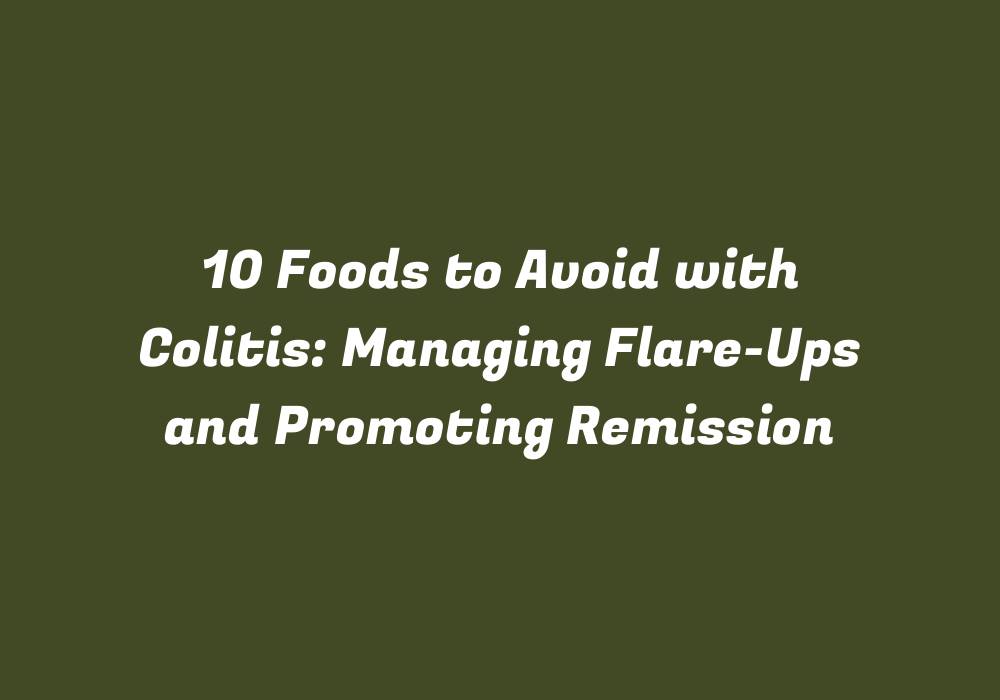10 Foods to Avoid with Colitis: Managing Flare-Ups and Promoting Remission
Colitis is a chronic inflammatory bowel disease that affects the large intestine. It can cause discomfort, pain, and frequent bathroom visits due to diarrhea. Proper management of this condition includes a combination of medications and dietary changes to minimize flare-ups and promote remission. In this article, we’ll discuss ten specific foods you should avoid when dealing with colitis to help alleviate symptoms.
1. High-Fat Foods
High-fat foods can exacerbate symptoms of colitis because they are difficult for the body to digest and can lead to an increase in stool frequency. Opting for lean proteins and low-fat alternatives can help alleviate pressure on your digestive system.
2. Processed Sugars
Processed sugars, such as those found in candies, pastries, and sodas, can contribute to inflammation, making colitis symptoms worse. It’s essential to consume natural sweeteners like honey or stevia while avoiding foods high in artificial sweeteners and added sugars.
3. Spicy Foods
Spicy food can irritate the lining of your digestive tract, causing further discomfort. People with colitis may want to limit their consumption of spicy cuisines and focus on milder flavor profiles.
4. Dairy Products
Dairy products can be difficult for people with colitis to digest, as they contain lactose, a sugar that the body cannot break down efficiently in some individuals. Those who have trouble digesting dairy should consider switching to lactose-free alternatives or eliminating dairy entirely.
5. Fatty and Fried Foods
Fatty and fried foods can be challenging for your digestive system, leading to diarrhea and increased inflammation. It’s best to avoid these items in favor of grilled or baked alternatives made with healthier oils.
6. Refined Grains
Refined grains, such as white bread and pasta, lack essential nutrients that can help manage colitis symptoms. Instead of consuming these items, opt for whole grains like brown rice, quinoa, and oats which provide fiber that can promote better digestive health.
7. Alcohol
Alcohol has been shown to trigger inflammation and may worsen colitis symptoms. If you choose to consume alcohol, do so in moderation and with caution as it can lead to dehydration and further irritate your digestive tract.
8. Artificial Sweeteners
Artificial sweeteners can be hard on the digestive system due to their chemical structure, which makes them difficult for your body to process. Opting for natural alternatives or avoiding sugary substitutes entirely is recommended when managing colitis.
9. Foods High in FODMAPs
FODMAPs, a short form of Fermentable Oligo-Di-Monosaccharides and Polyols, are sugars found in various foods that can cause gas and bloating. Limiting your consumption of high-FODMAP foods can help alleviate colitis symptoms.
10. Gluten
For some individuals, gluten may worsen the condition by increasing inflammation in the intestines. While not everyone with colitis has a sensitivity to gluten, those who suspect they may benefit from eliminating it should consider following a gluten-free diet.
Conclusion: Managing your diet is an essential part of managing colitis symptoms and promoting remission. By avoiding the ten foods mentioned above, you can minimize flare-ups and experience improved gut health. Always consult with your doctor before making significant changes to your dietary habits.
Remember, it’s crucial to work closely with your healthcare provider when managing colitis. A proper combination of medication, dietary changes, and lifestyle modifications can help you achieve better control over this condition.
